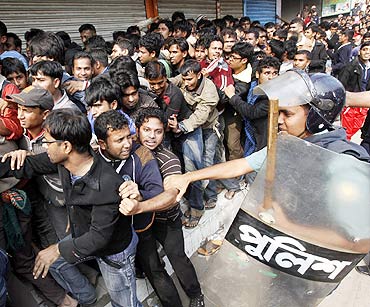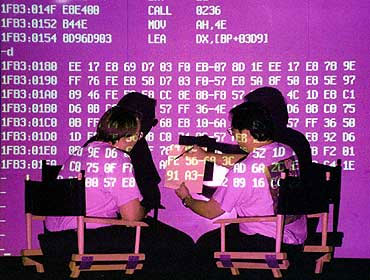Photographs: Krishnendu Halder/Reuters Vicky Nanjappa
With most tickets for the World Cup across the subcontinent being sold out, the cricket-crazy Indian is desperately hunting for alternatives to catch the matches 'live'. And this has got cyber criminals busy.
One scam doing the rounds involves an invite to attend the finals in Mumbai. With a private table, a gourmet champagne brunch and lot more on offer for 10 guests the deal seems more than attractive, but beware it's only bait.
...
Before Cricket WC, spammers and scammers have a field day!
Some of the spam messages flooding inboxes have subjects such as '2011 Cricket World Cup Final' and 'Experience Cricket World Cup Final.'
Spam and phishing attacks surge during cricketing events such as the Indian Premier League and T20 World Cup. But with the biggest spectacle of the year set to begin this weekend, more sophisticated spam and phishing attacks related to the World Cup will be witnessed, say experts. It's possible that during the course of the tournament, spam attacks will contain attachments that intend to distribute malware using fake video files purportedly showing highlights of the games.
Before Cricket WC, spammers and scammers have a field day!
Image: A police officer drags a man from a crowd gathered outside a bank to buy tickets for the cricket World Cup in DhakaPhotographs: Andrew Biraj/Reuters
Although World Cup tickets are in high demand, cyber experts advise that make sure purchases are made from a legitimate source. Users are advised to refrain from clicking on e-mails and opening attachments unless they are from authorised or official sources.
There are plenty of offers like enticing users to join the 2011 World Cup games where is the only winner is the spammer.
It has been further observed that phishing attacks offering tickets to the World Cup started as early as July 2010. One phishing website spoofed a legitimate social networking page, claiming that on entering login details the users will win a free tickets.
In the run-up to the event, cyber criminals are expected to employ sneakier and more deceitful methods to steal money, identity and reputation using phony e-mails, fraudulent websites, malicious e-mail attachments and online ads.
Before Cricket WC, spammers and scammers have a field day!
Image: Researchers at Symantec Corp Anti-Virus Research Center study a codePhotographs: Reuters
Guidelines against cyber crime:
- Don't respond to e-mails that offer you attractive and free deals, unless you are confident that the offer is from an authentic source and well-known brand.
- Never respond to e-mails that announce prizes you supposedly won in sweepstakes and other competitions you never participated in.
- Never give out your personal information and bank account credentials in response to any mail.
- Don't open suspicious e-mails or attachments
- Use an updated security solution, legitimate and paid security solution, which contains the latest technology.
- Do not click on suspicious links in e-mail messages.
- Type the domain name of your brand's website directly into your browser's address bar rather than following any link.





article